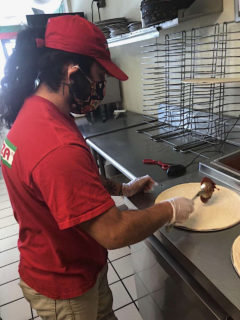Posted May 13, 2020
While the COVID-19 pandemic led colleges to move to online classes, many students also remained employed in a variety of jobs. Students who work faced challenges with scheduling, trying to find time to complete their courses and balance school with their work, ensuring that everything was done on time and to its highest quality.
Jordyn Brown, a senior at UW-River Falls majoring in social work, worked while doing online schooling. Brown is an employee at a liquor store in Hudson and is considered an essential worker.
Brown works around 30 hours a week as a cashier and stocker and is responsible for closing the store at the end of the day. She started working more hours right before quarantine precautions were put in place in Wisconsin.
“I have faced so many difficulties balancing online schooling with work and it has become very difficult for me to focus with the online platform,” Brown said. In addition to her job, Brown had an internship that occupied additional hours of her week.
“I’m burnt out from my internship which is still 20 hours a week of work,” Brown said. She added that no commencement and its requisite celebration made her senior year feel cut short.
UWRF senior Briclyn Bonin is majoring in agricultural marketing communications. Before spring break, Bonin was employed in Hudson as a nanny plus at a medical supply distribution company about 27 hours a week.
Since the shift to online classes, Bonin opted to move home where she works on the family farm as well as doing field work for a friend. In both cases she is considered an essential employee.
“I decided to leave because I had the opportunity to come home and help with calving season and spring field work,” Bonin said.

UWRF student Mateo Dietsche prepares a pizza at a restaurant in Oakdale, Minnesota. (Photo by Monica Marsh, Falcon News Service)
Bonin is responsible for checking cows and assisting in the calving process if needed. Chores include feeding, making sure the animals are healthy and happy and contacting the farm’s customers to take orders for the summer. Bonin works 40 hours a week.
“I try to designate one day a week for assignments. It’s harder to focus, but because I am not attending classes I find that I have more time to do my work,” Bonin said. “But being that my main focus is the farm right now, I do not care much about my schoolwork. I am just putting in the effort to pass my classes.”
While in his first year of the graduate program in clinical exercise physiology at UW-River Falls, Mateo Dietsche is employed at a pizza restaurant in Oakdale, Minnesota, where he is considered an essential employee.
“I moved home to be closer to family and be able to help more if needed,” Dietsche said. “All of River Falls was shutting down so I packed as much as I could, so I could continue to work and see family without the risk of exposing them.”
Dietsche’s work hours fluctuate from 17 to 25 or more hours a week, but he said work did not have a major impact on his schoolwork. However, Dietsche noted, “I find it difficult finding the time to do schoolwork and focus on schoolwork since I don’t feel like I am in school anymore.”
The adjustment to balancing work while keeping up with school has forced UW-River Falls students to develop a new set of time management skills and responsibility.
The article may be found online at https://uwrfjournalism.org/2020/05/6265/.
